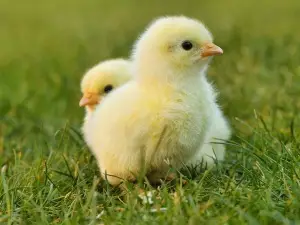
Baby chicks know exactly what to do after breaking out of their shell. They may seem a little uncoordinated and confused, but these animals usually figure it out soon enough.
If your baby chick keeps falling over you may be concerned, if so then this article is for you
If your baby chick keeps falling over, then the bird may be too young, or, it may have a disease that weakens its legs and causes it to fall over.
Table of Contents
My baby chick keeps falling over
Chicks don’t usually need you to interfere with them, they quickly figure out how to act after hatching. Still, some will have problems with falling over. This is why your baby chick keeps falling over:
The chick is young
Chicks who have just hatched will be clumsy for a little bit. They will fall over while walking, knock into eggshells, eggs, and other chicks in the incubator and explore their surroundings.
This is normal and you don’t have to worry, they are getting used to the new environment around them and finding their feet.
What to do:
You can leave your chicks in the incubator if they’re very young, this will not only help them figure out how to walk, it will also help them dry off and warm up.
They do not need to be fed for the first day or two because the yolk, which they absorb just before hatching, provides them with enough nutrients to sustain them for a couple of days.
Encephalomalacia
This chicken disease is caused by a lack of vitamin E, not by something external like bacteria, a virus, or a fungus. It is commonly known as ‘crazy chick disease’.
A lack of vitamin E in the chick’s diet will cause the bird to suffer neurological damage causing symptoms like a loss of balance, falling over, paralysis, circling, convulsions, and even death.
If a number of your chickens are suffering from this problem, then this may mean that your whole flock isn’t getting enough vitamin E from their diet
What to do:
Serving your young chicks a balanced and nutrient-rich diet is the way to go.
Avoid giving the bird too many treats like scratch, this food is not nutrient-rich enough to be given to these birds as a major part of their diet. Treats should only make up 10% of the bird’s diet.
Supplement the bird’s diet with additional vitamin E to get this nutrient into its body.
Taking the bird to a vet is recommended, your vet will be able to accurately diagnose the bird.
Mareks disease
This disease is quite common in chickens, it is caused by a virus and is very contagious. Birds can pass this disease onto other birds through contaminated feather dander, once a chicken inhales this dander, or eats it, it will become infected.
Many birds are exposed to this disease and their immune systems will fight it off, assuming that they are healthy.
Unfortunately, if the bird is stressed, the virus will overpower the bird’s immune system and cause the bird to become sick. Other symptoms of this illness, in addition to birds falling over, include clumsiness, leg paralysis, rapid weight loss, and cloudy eyes or frozen irises.
What to do:
The best you can do for your bird is to make sure that it is comfortable and has enough to eat and drink. Unfortunately, if your bird has this disease it will likely die
Vaccinating healthy birds is recommended, this will help decrease the mortality rate caused by this disease. Another benefit of vaccination against this illness is that there will be less virus in the bird’s dander if they get this illness.
Spraddle leg
Another name for this condition is splayed leg. Spraddle leg makes the bird’s legs weak preventing them from being able to hold weight. The bird’s legs will splay to the sides when it tries to stand. This will cause the bird to fall over when it tries to stand.
This condition is caused by brooding baby chickens on a slippery surface like cardboard.
What to do:
Splinting the bird’s legs is an effective treatment for this condition. Splinting will hold the chick’s legs and muscles in the right position until the bird can do this on its own.
You can use a band-aid to splint the legs. To do this, wrap the ends of the band-aid on your bird’s two legs to get it to stand straight.
Splint the bird’s legs for two days then remove the splint to check if there are improvements, if there aren’t, splint the bird for another two days. If the legs aren’t strong enough by the fourth day then they likely never will be.
FAQ:
Baby chick suddenly can’t walk:
There are a variety of reasons why your baby chick suddenly can’t walk, these include a drop in blood glucose, which causes them to have weak legs, a vitamin E deficiency, also called wry neck, and spinal or neurological issues.
If you notice that your pet can’t walk then get your pet to the vet as soon as you can.
Conclusion
In conclusion, very young chicks will usually start off by falling over right after hatching but if this goes on after the birds are out of the incubator then this is cause for concern. The bird may have Spraddle leg, Encephalomalacia, or Mareks disease.
If you enjoyed this article then you may also be interested in other chicken related articles. Here are some articles that you may be interested in: Chick Broke Shell But Not Membrane, Chick Pipped But Didn’t Break Membrane, Bump On My Chickens Head, White Spots On Chickens Head, Chicken Has An Abscess On Its Face

